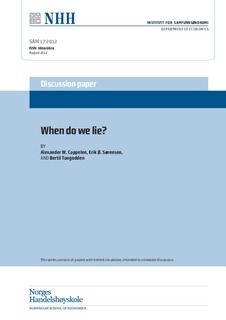When do we lie?
Working paper
Permanent lenke
http://hdl.handle.net/11250/163440Utgivelsesdato
2012-08Metadata
Vis full innførselSamlinger
- Discussion papers (SAM) [657]
Sammendrag
The paper reports from an experiment studying how the aversion to lying is
affected by non-economic dimensions of the choice situation. Specifically, we
study whether people are more or less likely to lie when the content of the lie is
personal, when they base decisions on intuition, and when they are in a market
context. We also study how aversion to lying depends on personal characteristics,
including age, gender, cognitive ability, personality and social preferences. Our
main finding is that non-economic aspects of the choice situation are crucial in
understanding aversion to lying. In particular, we find that people are less likely
to lie when the content of the message is personal. We also find large effects
from priming the participants to rely on intuition, but, interestingly, in this case
the effect only applies to males. Finally, we find that people who are highly motivated
by social preferences are more averse to lying, but there is no significant
relationship between lying behavior and other personal characteristics.
